|
|
« September 2007 |
Main
| November 2007 »
October 29, 2007
Wait Till Next Year!
OK, so the 2007 Rockies didn't turn out to be the 1996 Yankees, after all. You look for hope where it may lie, and in the case of the Rockies, there was hope pretty much until the final out. The Red Sox were the better team, and having won two Series in four years, verge on becoming Oceania to the Yankees' East Asia. Or Eurasia, depending on the year.
Losing the Series clearly diminishes what could have happened, but not what actually happened. I skipped out of the San Diego game feel good. I sprinted out of the LCS Game 4 feeling >great. I don't care if the whole world knows that we cheer, "From the Mountains..." It's no worse that Baltimore shouting "O" during the national anthem.
The Montforts, for all the grief they've earned and gotten, have done two things incredibly right. First, the Humidor(tm), meant that the Rockies were playing roughly the same game as the rest of the National League. The field may be bigger, but at least you don't have to carry 15 pitchers.
Second, they developed an organization rather than renting a trophy. The Yankees built their dynasty mostly on h ome-grown talent. The Orioles won all those pennants with a farm system. Both teams, once they started relying on spending, spending, spending, stopped winning winning winning.
There are people here - and I'm among them - who for the first time really can't wait to see what the Spring brings for this team.
So don't blow it.
This doesn't mean the Rockies have to win 96 games and the Series next year, though that would be nice. It does mean that the team has to make the transition from re-building to improving. That's a tough transition. The move from 80 wins to 90 wins is nothing compared to the move from 90 to 95, or even from the Wild Card to Division Winner. History says that most teams decline after a jump like this, especially one built on a streak rather than consistent, year-long performance.
Management will be tempted to over-rate itself. It may find it hard to irritate its new fans by dropping or benching players that became heroes in the last three weeks. Do it anyway. It may find it expensive to take care of the nucleus of the team. Do it anyway. It may find it disagreeable to hold the line on ticket prices. Do it anyway. It may really hurt to start looking for a new manager...
Hey, it's only 105 days until pitchers and catchers report.
Stealing Our Retirement
How much is that proposed property tax increase really going to cost you?
About three months of your retirement.
Proponents claim that the average Denver homeowner will only have to pay $62 a year.
Well, I happen to be Mr. Average Denver homeowner, I own a house valued at $255,000. I'm just over 40, which means I have about 30 years to go until I'm supposed to retire. Make that 30 years and 3 months.
Let's assume that the city government is never, ever, even under the threat of waterboarding, going to let me have this money back. They'll ask nicely, if they must, but the Light Rail Tax will follow the Coors Field Stadium Tax (Wait Till Next Year!) as the night follows the day, and, to mix metaphors, we'll end up having to pry our money loose from their cold, dead hands. This means that even if I'm able to sell my house somewhere down the line, the buyer, rational man that he is, will reduce what he's willing to pay by the after-tax amount of this tax he'll take on, as long as both he and the house shall live.
As for the amount of the tax itself, it's not going to stay constant at $62 (or about $46.50 after tax, since it's a deductible expense, at least until Charlie Rangel gets his glummies on the tax code). My house will, over time, appreciate in value. Let's call it about 4% a year, a pretty conservative number, all things considered. I bought a condo in 1989 at the top of the DC housing market, watched it decline about 30% in value, and then rebound to over double its low point. This condo appreciated at about 3% a year, and condos don't do nearly as well as houses over time.
Finally, remember that I'm going to be investing this money, too. About 8% a year is a good, solid guess, assuming that I'm not buying T-bills with it and that we don't have to live through 1930-31 again.
Put all these numbers together, and you get $8560 post-tax, inflation-adjusted. Thirty years from now, I've paid off the mortgage, and all other things being equal, $2900 in current dollars is a reasonable amount to live on.
That's three months of my retirement - and yours - that the Denver City Government wants to take from us.
Progressively More Expensive. Progressively More Intrusive. Progressively More Restrictive.
October 25, 2007
Live Long Enough, You See Everything Twice
The eventual pennant winner came from 3-1 down, scoring over 30 in games 5,6 and 7, while holding the opposition to single digits. They had won 96 games in the regular season, were perennial playoff occupants, had won the Series recently, and had much of their team intact.
In the other league, the pennant winner had breezed through its playoffs, aided by a controversial call against a division rival in the LCS. Few of the games were blowouts, but the series as a whole weren't close. It was a team whose stars were largely home-grown, who had a young, dominating closer. a rookie shortstop who seemed destined for greatness, and a first baseman who had been waitng for postseason glory for a while.
In Game 1, the team on a roll, whose bats were hot, crushing its opponents, cruised to a 12-1 win. They won Game 2, also. Then, the other team, whose manager had proclaimed, "They've got us right where we want 'em," swept the next four to win its first World Series.
Well, its first World Series in 18 years. It was 1996, and the Jeffrey Mayer-aided New York Leyritzes came back to stun the Braves. The Braves had themselves come back from 3-1 down, shredding the Cardinals 14-0, 3-1, and 15-0.
So, are the 2007 Rockies the 1996 Yankees? Well, in 1996, the Yankees weren't the Yankees yet, either. It wasn't a team loaded with All-Stars and Hall of Famers, though there were a few.
As long as the 2007 Red Sox look like the 1996 Braves, there's a chance.
October 19, 2007
Business and Baseball
So Manny Ramirez doesn't think it's the end of the world if the Bosox don't win the pennant this year. As usual, Manny's a little, what, isolated? out-of-step? oblivious? to the desires of the Red Sox nation. So yesterday, Mike Greenberg explained that fans want their players to care as much as they do, especially if they're making more in a year than most will make in a lifetime. And Mike Golic explained that it just doesn't work that way, that it's a job, and that getting paid more doesn't make you care more. We've heard it all before.
Then Greenberg said something like the following, and I'm paraphrasing:
Fans forget that for people inside sports, it really is all about the money. Sports is the only industry where what the customers want has nothing to do with what the owners want. Owners and players want to make money, while the fans want to win. Take our company, Disney. Do moviegoers care if they make a movie that wins the Oscar? No, not really.
Greenberg makes a mistake than many sports commentators make, when commenting about sports-as-business, and in doing so he lands himself completely on the wrong side of the discussion.
Let's point out first that successful teams make more money. With the exception of the Los Angeles Clippers, few teams can lose and continue to make money year after year. Getting taxpayers to build you a new stadium is a one-time boost, but eventually people get tired of watching a lousy product, and there are plenty of free places to see the mountains from. There's a reason the Braves left for Milwaukee, and the Expos are now the Nationals, replacing two previous DC baseball teams.
One reason the Yankees, Red Sox, Redskins, and Celtics are worth what they're worth is decades worth of building fan loyalty through winning. Championships. (Don't quibble with me about the Red Sox. They went to the World Series at least once a decade since the Babe was a bat-boy.) The A's obviously have better attendance and make more money since figuring out how to manage a budget and value-invest in players.
Bill James points out in his brilliant 1988 essay, "Revolution," that the competing business entities here aren't really teams, they're leagues. Except for a narrow swatch of Connecticut, the Yankees and Red Sox don't really compete for fans the way they do for wins. But MLB competes with the NFL for attention (also known as brosdcast revenue), and the Rockies compete with the Avs and Broncos and Nuggets for local attention. The reason the NHL #6 and sinking fast is that its games are on something called the "Vs." network, not because they Avs win or don't win.
While the Yankees may hate the Red Sox and the Cowboys may hate the Redskins, from a business perspective they need each other, like the black-white/white-black guys on that Star Trek episode. Because otherwise it's just the Black Sox throwing around a ball on a cornfield in Iowa.
James makes the insight that Greeny misses entirely: I buy a can of tomato soup because I want tomato soup. Just because Campbell's sees it as a business doesn't mean I have to. They may have better soup, or more flavors, or they may have better packaging, or more convenient sizes, or placement deals with Safeway. For them, that's business. Me, I just want a can of soup.
Baseball is selling competition. The minor leagues withered away into mid-inning diversions because of TV, yes, but also because their competition isn't real. The players care about stats because they want to get to the next level. Just like the managers. For them, success isn't winning an International League championship, it's getting called up to the majors and watching their old mates win that title.
When major league players don't care, or are perceived as not caring, it damages the honesty of the competition every bit as much as Giambi on the Juice. If enough players don't care, then the fans won't, either. They'll look for a league or a sport where players do care. And those players and owners will make the money.
October 17, 2007
History's Greatest Monster
The worst president of the 20th Century is back. (James Buchanan nails down Worst President of the19th Century; Carter only gave away other peoples' countries.) I had a chance to leaf through his new screed, Beyond the White House, at Costco, and within about 30 seconds found three examples of his trademark dishonesty, where Jews are involved.
First, he takes credit for expanding Jewish emigration from the Soviet Union to 50,000 in 1979. True, that many Jews left, but the issue was really forced by the Jackson-Vanik Amendment to the 1974 Trade Act, Section 402, which he opposed at the time. The Soviets only let 50,000 Jews out because they wanted to clean up their image before the Olympics, kind of like the Chinese starting an anti-sptting campaign.
Second, he claims that Israel's security fence is intended to surround the Palestinians in the West Bank, "as in Gaza." He "discovered" this on a 2004 trip to the country. Of course, Israel has since completely withdrawn from Gaza. I'm sure this fact is mentioned elsewhere in the book, because Carter's ultimate goal is to repeat that success by having Israel withdraw from Israel.
On that score, Carter finds much to praise about Palestinian democracy, noting that "all Palestinian elections are models of peacefulness, honesty, and orderliness." Apparently the killing before and after the actual ballotting doesn't count. You know, "unraveling of public order," and all that.
Follow The Money
The latest federal campaign fundraising numbers are in, and at least as far as Colorado goes, they don't hold a lot of surprises, although they do help explain Mark Udall's and Ken Salazar's bizarre behavior in regards to the smear of Rush Limbaugh.
According to the FEC numbers, Obama has outraised Clinton in every three-digit zip code grouping that they share, and is way ahead in the lucrative 803xx grouping, which includes Boulder. There, he leads almost $370,000 to just over $130,000. Even in the more mainline city of Denver area (802xx) Obama has outraised Norman Hsu Hillary, $300K to $140K.
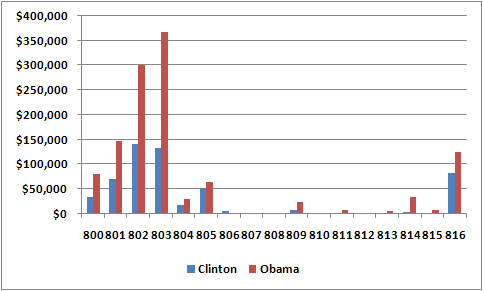
One the Republican side, Romney leads Giuliani, a testament to his high-powered fundraising team, which includes Bruce Benson and other traditional Republican luminaries. Giuliani leads in the Western Slope, with Romney well ahead in Douglas, Elbert, and Arapahoe Counties, and the two basically even in Denver.
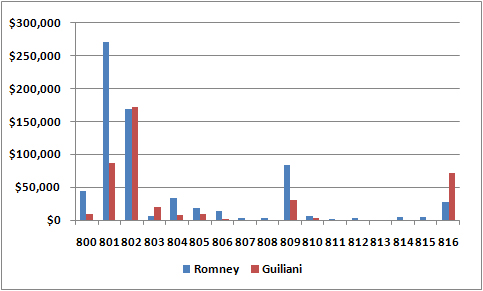
But the numbers in Boulder explain a lot. This is the home of the most rabidly anti-War, invested-in-defeat, environmentally radical MoveOn.org Democrats in the state. In the 803xx zipcode group, Democrats outraised Republicans $570K to $68K. These are the guys who are calling the shots in state Democratic politics, having decisively put the more labor-oriented Pueblo Democrats in the back seat.
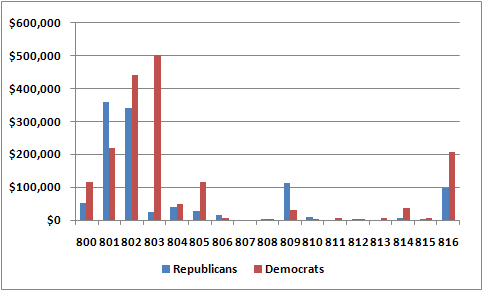
It explains Governor Ritter's impending sellout of affordable energy in the state. It explains Ken Salazar and Mark Udall - both either holding or running for statewide office - jumping on the chance to lie about Rush Limbaugh's comments on his radio show, and an attempt to corral the power of the Congress into doing the same. (It also explains John Salazar's sponsorship of the Stolen Valor Bill, which according to the Sorosians, addresses a problem that doesn't exist, although it might be embarassing for Tom Harkin.)
As someone once said about the Republican version of Hillary Clinton, follow the money.
October 16, 2007
The Rockies Win The Pennant! The Rockies Win The Pennant!
Just some photos from last night. You already know what happened.
The pre-game scoreboard. In case there was any doubt, I wanted to remember I was here:
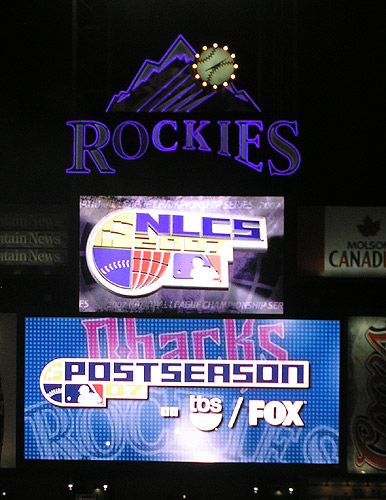
The color guard:
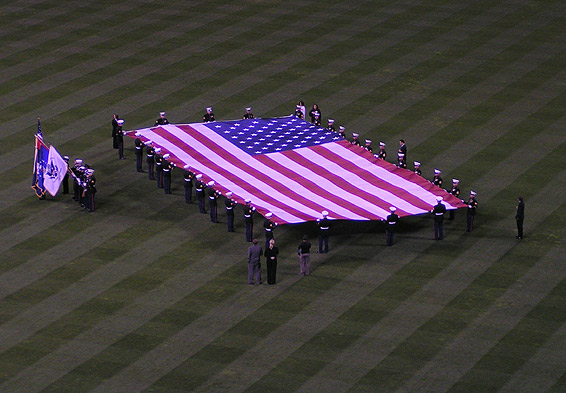
You can't even see the row of purple seats:
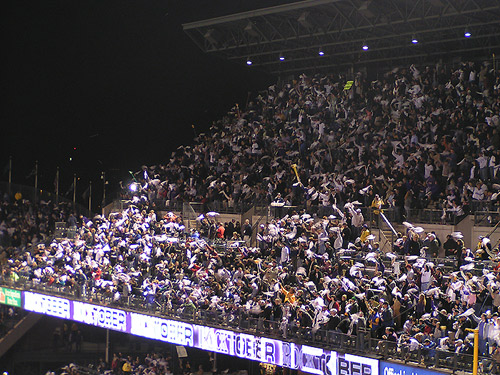
Helton Batting:

Holliday in mid-homerun swing:

The celebration. I have to say, I liked it better when they felt they could trust the fans to run out and mob the field, also:

Media Time, as they wheel out an oversized pingpong table:
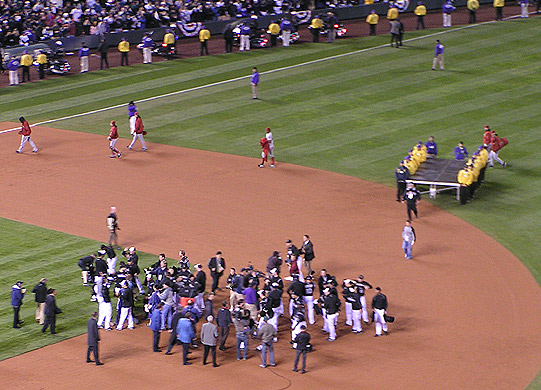
This is what happens when you get hot at just the right time:
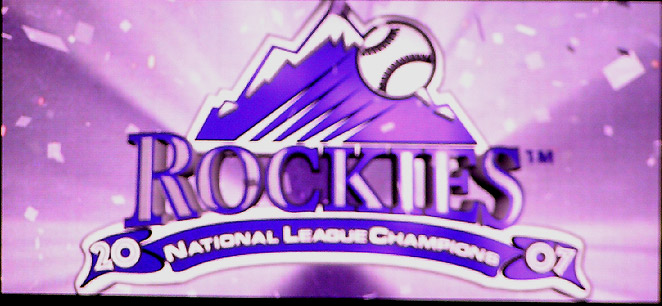
October 15, 2007
A Few Questions Before Buying
I've written here before about the proposed property tax hikes. Here's a list of 9 questions - plus follow-ups - that those proposing this increase should have to answer before we vote for any of these bonds, and certainly before we vote for the mill levy increase:
1) This set of packages will exceed the city's bonding authority. How is the limit of the bonding authority determined? How often is it re-assessed? At what point will it be raised again?
The city may need more money for more pressing projects, or may discover the need for additional revenue after the current bonding limit has been reached. It's important to understand how that limit is arrived at, and what effect raising our debt multiple times would have on the city's bond rating and our ability to pay.
2) What is the city's current bond rating? What is the interest rate expected to be, and when do the bonds mature?
Speaking of which, what is the current bond rating. I assume it's pretty good, but it'd be nice to know. And what are the terms on these general obligation bonds that are being issued?
3) How do the amounts raised compare to the amounts required by the individual projects? In effect, what's the allowance for possible overruns?
For instance, there's a $40 million proposal for a new concert hall. How was that number arrived at, and how did the budgeting process for these individual projects differ, if at all, from the normal city budgeting process? We've a had a boatload of cost over-runs and questionable expenditures over the last few years, so perhaps a little oversight in the matter might be in order.
More important, since we're now hitting the limit of our bonding authority, how likely is it that these same agencies are going to come back, hat in hand, for more money to finish the projects we've voted to start? If there are cost over-runs, what is the City's obligation to finish what it starts?
4) Who were the panel members, and how were they chosen?
The mayor has some pretty effective ads talking about a citizens' committee that helped set these priorities. Which citizens, and how did he choose them? What common assumptions did they have going in that need to be challenged?
5) During the process, what effort was made to assess where the additional spending could be offset by savings in other parts of the city budget? How was the list of projects to be funded arrived at? Was there any attempt to prioritize these within the overall city budget?
For instance, this one. Look, if rehabbing the Greek Ampitheater is so important as to require a tax increase, maybe it's more important than something that's already in the budget. Something that could be cut. What efforts were made to figure this out, or was there just a limit assumed and then projects were cut or kept on the basis of fitting under that cap?
6) The city has pointed out the expected effect on the average homeowner. Is the average price the median home price or the mean?
It's a simple math question. Because if this is the median, 50% of homeowners will pay more than the oft-quoted $63 a year. And if it's the mean, then we're adding another more-progressive-than-it-seems tax to the tax burden.
7) Will the property tax increase apply to residential rental property? If so, what will be the effect on the average renter? What is the average income, and average rent, of a renter in Denver?
I assume it would apply to apartment buildings and certainly to single-family rentals. We've heard much about that $63-per numbers. But Denver has a large and growing renter population. Growing because of foreclosures. Right now, a lot of people may not be in a position to move farther out, and landlords will try to pass at least some of this tax increase along to renters. It's important - and so far completely unaddressed - to know how the increase will affect renters.
8) Will the tax increase apply to commercial rental property?
Again, postentially increasing the cost of goods and services sold, or alternately making it harder for businesses to get by. Don't think Starbucks here. Think your local, funky, protest-flyer-on-the-wall coffee shop with the free-range beans and the free wifi.
9) What guarantees are there that the money will not be shuffled around, a la Referendum C revenues, so that existing non-mill-levy revenues will continue to go to infrastructure?
The Independence Institute has shown that non-Ref-C priority areas have grown faster than the supposed Ref C areas of the Colorado budget, indicating that all that Ref C money isn't going where it's been promised. Money is fungible. What guarantees do we have that the government won't take current maintenance money out of the budget, and then come begging for more in a couple of years?
So far, I have seen the local papers address exactly none of these questions. Government officials are particularly good at putting forward tax proposals, on the grounds that they're all for good causes. They rarely get asked questions about how these particular causes are arrived at, or how they set priorities within budgets. So they're used to being able to tell us, unchallenged, that we "need" this or that amount of money for some project or other, or for ongoing operations.
They're also quite good at minimizing the effect of their new piggy banks on ours. Here, for instance, they give the numbers for the average homeowner, who may not at all be the average resident.
They're particularly good at gaming the process to limit the amount of time, discussion, and questioning before a vote, then claiming emergencies and lack of time for discussion.
Housing prices are dropping a little here. The government wants to raise taxes on your most valuable asset. For those of you who rent, it wants to make it harder for you to save for that down payment.
Don't you want to know how they came to this conclusion, before writing out a bigger check each year?
Upon Further Review...
...that last posting was way too sour. I just took the opportunity to mention everything about the current MLB experience that I don't like, forgetting to repeat how surprised and grateful we are all to have the chance to watch baseball in October.
As I've mentioned before, I had never been to a professional playoff game of any kind, so aside from bunting and six umpires, I hadn't thought there would be any real divergences other than the atmosphere, or at least hadn't known what ones to expect. My guess is that the Rockies themselves hadn't really expected to be here, either, so they're throwing together what pageantry they can think of, dialing around to other teams. Inexperience has its charms. But for all I know, MLB could have standards too, like the three color guards instead of one. The Rockies as a team are a class act, and while the organization as a whole has been faulted for being cheap, that certainly wasn't on display last night.
Cheering, "from the mountains" during God Bless America is a traditional that appears to have developed from the bottom-up, kind of like Orioles' fans shouting, "O! say does that star-spangled banner yet wave..."
I still think shooting off fireworks during the Star-Spangled Banner is cheesy, though.
October 14, 2007
Game 3
I just got back from Game 3. Whenever you hear someone say something like, "Well, it's 20 degrees, with mixed rain and hail, but nobody here seems to mind one bit," remember that it's said by someone sitting safely in his warm studio. I sure as hell minded.
I would have minded a lot more if they had lost, though. As it was, sitting through an interminable 7th Inning, with multiple songs, multiple base runners, and no runs, was more than enough, thank you.
One thing mercifully missing from this game was the relentless noise from the speakers that makes conversation at regular season games require walkie-talkies between neighboring seats. There was enough of it all right, including the terminally insulting, "Get Loud!!!" accompanied by some indeterminate music with a tremendous bass backbeat. But the music in-between every pitch was missing, as was a fair amount of the player theme music. I can't help but think some of it was a result of the National Television Audience, announced to great enthusiasm at the beginning of the contest.
The fans were funny, as always, booing Barry Bonds on the MLB season highlight reel, and the upper deck trying to start a Wave in the 9th. (A Wave! At a baseball game! In the 21st Century! Next thing you know, they'll be bringing back wooden outfield fences and bleachers, and passing out parasols to the ladies during hot summer days.) I did think the fireworks (rockets, red glare, bombs bursting, &c) during the national anthem was in dubious taste, though.
As for the game, despite the win, the Rockies could easily have lost this game, and lost it in the first inning. Before the D-Backs' home run, they had been hitting Fogg hard, driving the ball all over the park, only right at guys. The Rockies got three double plays in the first three innings, which means Arizona had men all over the bases, too.
For the first time, Holliday, despite his home run, showed visible frustration when he popped out and left men on. Guys, you're facing the best pitching day in and day out every game. Enjoy now, because it's only going to get worse.
It was only win 20 in 21 games for the Rockies, and suddenly, the World Series looks like it may be headed to Colorado. Truly, we are in the End TImes.
In A Cardboard Belt!
“I interest myself.” That was Joseph Epstein’s motto during his 23-year run as editor of The American Scholar. Not a bad philosophy, when your interests are as broad as his. He interests us, too, in his latest collections of essays, In a CardboardBelt!
Epstein just turned seventy, so his age has finally caught up with his writing. His essays have always had an air of maturity about them, both in subject and in tone. His two collections of short stories were both about characters a decade older than himself at the time. Even the titles of his books – The Middle of My Tether, Narcissus Leaves the Pool, With My Trousers Rolled – evoke age. So it’s not surprising that some of his themes begin to reflect age. He writes of his own age, his leave-taking from lecturing at Northwestern, his father, and memorial and obituaries in general.
His topics are, as the Table of Contents indicates, Personal, Attacks, Literary, and Intellectual. Epstein’s writing is fluid, light, witty but not gut-bustingly funny. He’s mastered the art of letting the essay flow from one aspect of the subject to the next. He writes so well that a cursory, 10-minute review yielded 14 Post-It notes. Memorable lines, but not necessarily quotable ones. Even the anecdotes require context to make sense.
There are a few darts. In his essay on Proust, he remarks about one reader-turned-memoir-writer:
…[Phyllis] Rose offers an example of the limits of education and culture, for in her a vast overlay of both has not been able to cover up the inexhaustible shallows of a confident but unoriginal mind.
While the cover promises “savage” essays, those looking to read, or have the easy pickings of responding to, Ann Coulter-like screeds will be disappointed. The essays in the Attacks section are essentially the same as the ones in the Literary section: smart, insightful dissections of people or their careers. None of these really goes beyond his earlier essay on Robert Hutchins of the University of Chicago, the “Boy Wonder.”
The exception is his slicing up and serving of Mortimer Adler, which even then, is done in typical Epstein-like style. The impression one has is of one of those cartoon swordfights, where one character flicks his sword through the other a few dozen times, while slices of the filet, eyes still blinking, slide neatly into piles on either side. Beginning with Adler’s myth, he neatly, methodically reduces him to a figure of fun.
I do not know of any genuine contribution that Mortimer Adler made to serious philosophy, though before he went into big-time indexing he was though a serious Thomist… Sidney Hook once told me that it was proof of Dewey’s honorableness that not even Mortimer Adler could drive him into anti-Semitism.
Ouch.
The personal essays are among the most fun, possibly because they shed light on common experiences. His essay on how, after 70 years, he’s figured out that he really doesn’t like to travel, is brilliant.
“I hereby sentence you,” runs a standard judge-and-defendant cartoon in a recent New Yorker, “to the Vermeer show on a Saturday afternoon.”
Not funny, McGee. Not if you have, as I have, woken in the Jan Luyken Hotel in Amsterdam at 4 A.M. to drive to The Hague to stand in line in the cold drizzle of a Dutch morning to get tickets to see twenty-six paintings by Vermeer as part of a crowd that was even more wall-to-wall than the carpeting.
Unlike most 57-word sentences, you get to the end remembering where you started. Extra points, too, for knowing who McGee is.
On eating out, in the 1970s: “One would go to a party and be asked, not what one thought of the latest Robert Altman or Woody Allen flick or (more important) what Pauline Kael thought of it, but if one had been to the recently opened bistro on Halsted Street or trattoria on Southport.” The joy, the choices, the trendiness, the shallowness.
Epstein’s essays are rich because he makes serious points tangentially: “The Brothers Ashkenazi remains a magnificent novel, one in which the villain is no less than the country of Poland, and the first book in which I learned, a lesson often repeated, that the one thing the far left and the far right always come around to agree upon is hatred of the Jews.”
On cleaning out his library, getting rid of thousands of books: “The Russians did not do well in this purge.”
The set also includes his final essay for The American Scholar, must-reading for anyone who wants to understand the ravages of political correctness and identity politics. Epstein writes without rancor or malice about the decision to force him out. Indeed, he focuses more on the board and its historic personalities, who turn out to be a lot like everyone in every board meeting of any organization you’ve ever attended.
One can’t help but share Epstein’s evident more-sadness-than-anger about the board’s decision to sack him in the face of identity politics – in this case, animosity over using the word, “homosexual” instead of, “gay” in a submission. That decision then led Phi Beta Kappa, which publishes the journal, to sit on and then reject a $2 million gift – and all the good it could have done – from a conservative organization, supposedly out of fear that it might save Epstein’s job. So much for fiduciary responsibility.
Still, Epstein is turning seventy, not dying. Even if The American Scholar doesn’t want him around, here’s looking forward to the next book.
October 13, 2007
Marketing Geniuses
I see where the brilliant minds that run baseball decided to start their only playoff game tonight at 8:30 Eastern, with both teams from the Eastern Time Zone. The better the game, the more likely to hold interest late. It's now almost 1:00 AM in the east. The game is going into extra innings, tied 6-6.
I'm not one of these people who thinks "it's all about the kids." When people bring up the kids, it's almost never about the kids. It's about the adults. And asking even adults to stick around until 11:30 for a normal-length game is asking them to wake up on the sofa with an infomercial running, bearily reaching for the remote to click to ESPN News to see who run before stumbling off to bed.
A full stadium, by the way, means less than nothing. Those people spent hundreds of dollars on those tickets. You think they're going to leave?
There may only be one October, but this scheduling is designed for people to say, "Wake me up when it's November."
October 12, 2007
Newspaper Tech
Hate Sprint. Love the technology. I love the Sprint wireless card, and I love the Palm Treo I've had for about a year.
Now, if only the local papers could catch up. It's not like they don't know about the Net. In fact, the Denver papers have been among the best in integrating New Media into their operations, including archives, blogs, neighborhood blogs, online community-building, the woiks. The fact that the Denver Post website is the visual equivalent of a SWAT team crashing through the window is beside the point.
And yet, they have nothing mobile. I can go to mobile.boston.com, or mobile2.wsj.com, or mobile.washingtonpost.com. The New York Sun, Boston Globe, and Cleveland Plain Dealer websites will browser-sniff and automatically send me to their mobile sites.
Maybe we can roll the request into one of the Mayor's bond refereda...
All Part Of The Plan
For those who care to see below the surface, it should be obvious that the Nobel Committee's awarding of the Peace Prize to Al Gore is part of a plot by the Right to discredit the award.
The notion of "Peace Through Economic Suffocation" is so absurd on the face of it that it can only be explained by the machinations of the Bush-Rove-Cheney-Limbaugh Axis.
In any case, rumor has it that Al Gore is chartering the QE II to ferry his lawyers over to Oslo in the event of a recount.
UPDATE: Seriously. We know that many wars get started over resources. Why? Because resources represent wealth, either now or in the future. We see this every day in Africa, where Euro-led opposition to GMOs is starving millions of people to death. How is artificially depressing the world's economy, reducing its real and potential wealth, going to serve the cause of peace? It's more likely to cause war and instability than to encourage people to settle down to, what? To business they're not allowed to tend to?
Perhaps the only thing that could prevent these conflicts is the threat of UN blue helmets raping the children you're fighting to feed.
October 11, 2007
Running the Bases
Second base, graveyard of empires.
OK, it's not exactly Babe Ruth being thrown out to end the 1926 Series, but still. I knew bunting was more or less a lost art, Jeff Cirillo aside. Who knew that timing your slide so that you stopped, you know, on the bag, would be that difficult. I mean, it's not like he's been doing this on a 90 ft. diamond since 6th grade or anything.
As for that other play, the one that prompted the Plague of Plastic Water Bottles? Now, it's perfectly ok to slide in hard to break up a double play. I even remember it being ok to barrel-roll into the base. There's a famous picture of Ty Cobb that looks as though he's just finished doing exactly that. Although Cobb also used to file his spikes to the point where they could substitute for phonograph needles, so on second thought he may not be the best reference here.
What it's not ok to do is to barrel-roll into the base and do your Jack Tatum impersonation. There was a time about 100 years ago, when a baserunner coming home could count on knowing he'd been somewhere. He'd get spiked, held, elbowed, and whatever else wouldn't show a mark. That's why they went and formed the American League.
Now people will say tomorrow that it cost Arizona the game, and they did indeed load the bases after that. But without the play, it's an almost certian double play anyway, which is why the ump could call it the way he did. The call sure didn't help Arizona, though. With a no-call, it's 1st and 3rd with one out. If the rest of the inning plays out the same way, they get two, possibly three runs, and the whole complexion of the game changes the rest of the way.
Man, do I love October.
Already Perfected
So here, at the end of the day, after the Rockies have won yet another game in impressive fashion, and possibly raising the value of the two spare tickets I have for Monday night's Game 4, I finally have time to deal with Miss Coulter's riff.
First of all, yes, this is the basic Christian line as I understand it. Most Christians have the decency not to bring it up all the time, but we believe that the Torah is complete already, and they think it needed a few appendices. We believe that we have to follow all sorts of rules; they believe that they can get to Heaven a lot faster by just accepting Jesus. For the most part, we agree to disagree, and not to go crying to enlist the government for help in the matter. No harm, no foul.
But Coulter was asking for this. She got asked what the country would look like in her dreams, she said Christian, and Donny Deutsch took exception, as she probably knew he would. She volunteered this. He didn't ask her about her religion. She took it down that road, although he was all over it like white on rice.
Secondly, she has no business assuming anything at all about Deutsch's religiosity, and whether or not that makes any difference as to his suitability as a Christian. Jews may not like implications of Christian eschatology, and we may be pleased when it turns in certain directions. But we have no right to dictate what it should be. In the same way, it's none of Ann Coulter's business what makes a good Jew or practicing Jew, and she's got not business voicing an opinion on the matter.
For some reason the Corner is virtually silent on the matter. Possibly because they fired her for this kind of garbage 6 years ago.
Leading With Your Chin
So I'm sitting here, listening to KNUS, when on comes an ad for CITGO gasoline.
"We bring you a steady stream of Venezuelan oil..."
It's not often you hear an advertiser openly and honestly give you the best reason for avoiding their product like the plague, hoping they'll shrivel and die.
And on KNUS, Salem Radio, which isn't exactly a target market filled with warm fuzzies for Herr Hugp.
October 10, 2007
The Founders On Immigration and Citizenship
Last year’s immigration debate left quite an impression on the body politic. It certainly left an impression on the Congressional switchboard operator. But for all the sturm und drang, the discussion barely left the realm of conventional partisan politics. We spent a great deal of time arguing fences and paths to citizenship and ID cards, and very little time on what citizenship means, and what it means for immigration.
We again forgot that the Founders thought about these problems when setting up the country. We also forgot that the Progressives had their own vision for immigration, thoroughly at odds with the Founders.
Into this breach of historical myopia steps the Claremont Institute, with The Founders on Immigration and Citizenship, a collection of four essays by Institute scholars.
While the Claremont Institute is commonly thought of as a conservative think-tank, it’s one with a unique point of view. Stressing the unique and original ideas of America’s Founders, it specializes in what has come to be called Originalist legal and philosophical thought. For Claremont, the great tragedy of American history isn’t the 60s, or even the 70s. It is instead the betrayal and subversion of those ideas by the post-Civil War Progressives.
For the Founders, immigration was to be based on the kind of citizen an immigrant was likely to become. That men had a natural right to emigrate was assumed. That a society had the right, by virtue of the social compact, to decide whom to accept, was just as evident. Included in that calculation was his moral character. Immigrants from more free societies were more likely to have the habits of thought of free men, thus more likely to become better citizens. Those from more despotic regimes would have to be accepted in lower numbers, hopefully to be dispersed throughout society to help speed assimilation. They were more likely to be comfortable with a government dispensing favors. Either way, emigration and acceptance attached to the individual, not to a group identity.
The Progressives planned to re-shape the government into a centralized administrative state, informed not by reason but by science. The saw the government not as a means for securing individual natural rights, but rather for creating rights, and distributing their fruits on the basis of group identity. Making common cause with the nascent socialists and eugenicists, they saw race and class as the most important defining groups. (Convicted by their own writings, the Progressives resented and belittled the Constitution’s restrictions on their plans.) To the Progressives, it made perfect sense to choose immigrants by race and class, rather than culture and ideals.
The book contains four essays: and introduction, a legal case against birthright citizenship, an examination of the historical effects of immigration policies, and the Progressives and immigration. The most legal is Ed Erler’s attack on birthright citizenship. Policy-wise, Erler is worried about anchor babies serving as the bridge to transplant entire Mexican towns to the US, but he makes two critical points. First, the notion of birthright citizenship derives from British common law, which in turn derives it from the feudal relationship between lord and serf. The British held that to be born in Britain was to owe eternal allegiance to the Crown. Put that way, it’s not surprising that a bunch of revolutionary separatists would have a dim view of that basis.
Second, the authors of the 14th Amendment, which is quoted in favor of birthright citizenship, never intended for mere geography to determine citizenship. Children of visiting diplomats, for instance, and members of semi-sovereign Indian tribes, were not considered to be subject to the jurisdiction of the US, in the Amendment’s own language. Whether or not 100 years of contrary interpretation can or should be overturned is another matter.
The two other essays persuasively set out the differences between the Founders and the Progressives, relying largely on their own words. Impressive because they need to show not only the differences, but also their radical nature. West also has a disturbing answer to a question that has bothered me for some time: why was an American population that had soundly rejected Progressive revisions in the 19th Century willing to put up with them in the 20th?
The entries overlap a little, repeating primary sources and quotes, especially from the Founders. While a bit tedious, this actually serves the book’s purposes, reiterating what sources are important.
More frustrating is the number of secondary sources cited for primary quotes, unnecessarily complicating efforts to trace sources, or to check their context. Given Claremont’s reputation for probity, it’s unthinkable that the quotes are unrepresentative of their authors’ thinking. It represents un-Claremont-like editorial sloppiness.
Claremont has no specific policy recommendation at the end of the book, at least not an explicit one. Ed Erler would be happy to get rid of birthright citizenship, and there’s no question that the Claremont guys are uncomfortable with the transplantation of whole sections of Mexican society to the United States. Essentially, the country is setting itself up for trouble, clearly unwilling and possibly unable to assimilate this population into American political and economic ideals.
To their credit, they recognize that this is not, at heart, a partisan issue. Liberal Democrats who want votes have conspired with Republicans, who cater to business’s desire for cheap labor, to keep the border open. Likewise, both parties contributed to the racist revisions of the immigration laws in 1924. Indeed, when the Wall Street Journal’s Dan Henninger said that for many conservatives, the issue was culture, not economic, it represented a split between traditional Republican allies (and a comment that the traditionalists should have embraced, rather than defensively accusing Henninger of accusing them of racism). And while conservative activists may have forced stronger enforcement provisions into last year’s comprehensive bill, it succeeded in peeling away enough liberal Democrats to help defeat the measure.
As usual, the Claremont Institute shows that for those willing to listen, the Founders have something valuable to say on a topic of current interest.
October 2, 2007
Everything Old...
...is new again. The Denver Club Building, 1954:
  
And the Horizon Bank Building, Now Open!
 
Play-In. Playoff.
On the whole, they'd rather be in Philadelphia.
It may not have technically been a playoff game, but there was bunting (and Kaz Matsui's bad bunting), and there were six umpires (none of whom could see a home run), and it was one-and-done for both teams, so it sure felt like a Game 7.
Somehow, the Rockies, who couldn't hit middle-school middle relief all night, took this year's presumptive Cy Young Award winner, and a Hall of Fame closer, and knocked them around like a couple of rag dolls. Somewhere, Jorge Julio is buying Rolexes for the top half of his team's batting order. And Matt Holliday justified an M-V-P chant that had gone a little hollw after botching a game-tying fly ball to left.
Actually, you can blame me for that one. I don't have access to the office after-hours, so I took the laptop to the game with me. With the Rockies up 6-5 in the top of th 8th, I decided to go ahead and buy tickets for a possible NLDS Game 4 here on Sunday. As I was going through virtual checkout, the Pods hit a game-tying double. I closed the laptop, and only re-opened it after the winning run was recorded. I now have two right-field corner seats for Sunday's game, so if you're in Vegas, your best bet is a 3-game sweep.
A couple of game notes. I haven't actually been to many Rockies games this year, so I hadn't seen Ture-lure-witzki's stance. Let's just say it would make Larry Craig proud. I have no idea how he generates power from there, but evidently he does.
Blown home run call or no, the Rockies got themselves into trouble all by themselves. Their defense - which has been sparkling all year - generated one formal error and three mistakes. Holliday misplayed that fly, but the third-baseman-at-the-time pulled Helton off first with a wild throw, and Tulewitzki bobbled what should have been a relatively easy play at first. If that's nerves, then at least nobody else in the NL has much playoff experience, either.
At the time, I thought manager Clint Hurdle was way too fast with his relievers, running through Fuentes, Affeldt, Corpas, and Buchholz in the space of about two innings. Herges was game, but the quick moves - especially pulling Corpas for a pinch-hitter who flailed away like a pitcher - left Hurdle with Jorge Julio in the 13th. Julio was so wild, you wanted to yell, "Aim at the mascot!" But having survived, he's left with a basically intact bullpen, since nobody went more than warmups.
I did think the intentional walk in the 11th, with one out, was playing with fire. I've never liked intentional walks. Pitchers are trained to find location, and making them throw four straight junk balls just never seems like a good idea. But further, suppose the batter sacrifices the runner to third. There are two out. The next guy needs a hit to bring him home, the same as you need to score the guy from second. And if you're that scared of him, the pitcher's spot was up next. Hurdle had a chance to force Black to either waste a chance or a waste a pitcher, and he passed it up hoping for a ground ball.
These are quibbles, to a degree. The Rockies have played both the Phils and the D-Backs well. And for the moment, we do indeed have Rocktober. When a friend of mine - a Red Sox fan - asked if I had ever seen anything like it, I couldn't resist the obvious. This wasn't Bill Buckner or Bill Mazeroski, or even Kirk Gibson. But it'll do.
|

Power, Faith, and Fantasy

Six Days of War

An Army of Davids

Learning to Read Midrash

Size Matters

Deals From Hell

A War Like No Other

Winning

A Civil War

Supreme Command

The (Mis)Behavior of Markets

The Wisdom of Crowds

Inventing Money

When Genius Failed

Blink: The Power of Thinking Without Thinking

Back in Action : An American Soldier's Story of Courage, Faith and Fortitude

How Would You Move Mt. Fuji?

Good to Great

Built to Last

Financial Fine Print

The Day the Universe Changed

Blog

The Multiple Identities of the Middle-East

The Case for Democracy

A Better War: The Unexamined Victories and Final Tragedy of America's Last Years in Vietnam

The Italians

Zakhor: Jewish History and Jewish Memory

Beyond the Verse: Talmudic Readings and Lectures

Reading Levinas/Reading Talmud
|
















































